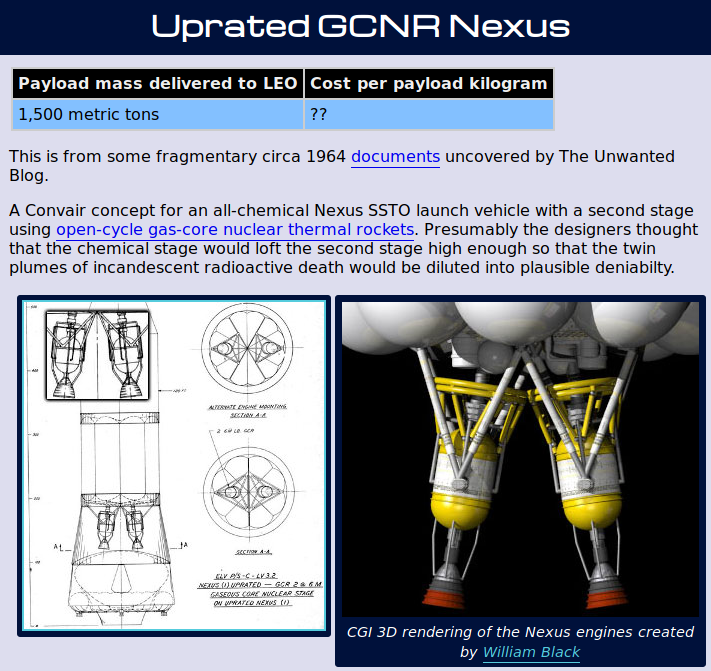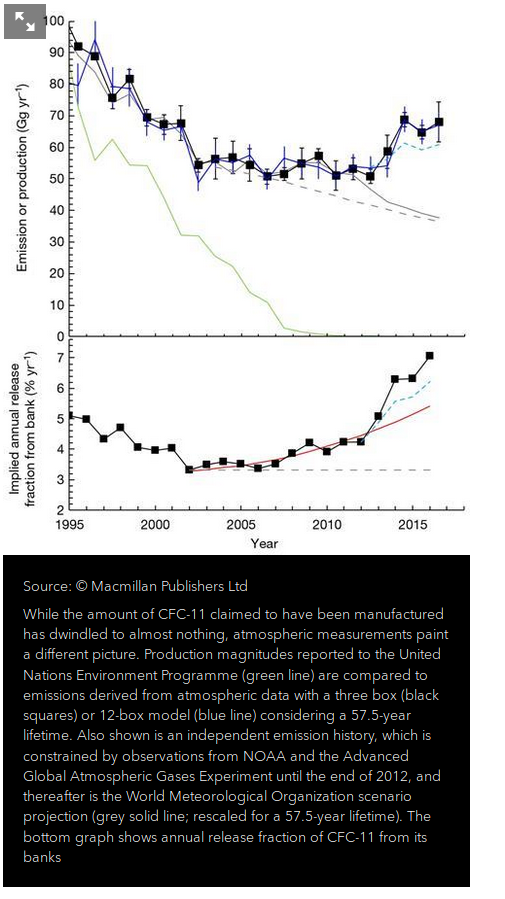You ever read a phrase and it just gets stuck in your brain for years like a catchy pop song?
For me it's "diluted into plausible deniability" from @nyrath's Atomic Rockets page.
For me it's "diluted into plausible deniability" from @nyrath's Atomic Rockets page.
He's talking here about a rocket with a open-cycle gas-core nuclear rocket that'd spew radiative exhaust, but it has chemical rockets to get it high enough up that the exhaust would be spread out over a large area and not as (directly) deadly
cause man, once you start thinking about that approach to the environment, you realize how often that is approach #1 to dealing with hazardous waste.
Dilute into plausible deniability.
Dilute into plausible deniability.
Like I was thinking about that phrase this morning cause I saw someone had smashed a glass bottle in the parking lot of my apartment, and I was thinking how no one is going to clean that up. it's just gonna get spread around by car tires and wind until no one can be blamed
ahh, you got a flat? well you could have punctured that tire anywhere. it's definitely not any specific person's fault, it's just what happens.
and how so many industries do that kind of shit but on a much bigger scale. You got cancer? well, you're not working at Bob's Radioactives Plant, so it's definitely not that.
but yeah, we've spent decades diluting out the PCBs in the drinking water and the asbestos in the era from all the demolished buildings and the radiation from all the above-ground nuclear testing we did for way, way too long. so there's no one person we can point blame at.
And you see this with things like how we've approached the ozone hole vs. global warming.
The ozone hole was "THESE 12 SPECIFIC ARTIFICIAL CHEMICALS ARE KILLING US" and we had the names and addresses of all the companies making them.
The ozone hole was "THESE 12 SPECIFIC ARTIFICIAL CHEMICALS ARE KILLING US" and we had the names and addresses of all the companies making them.
global warming? well, that's everything. carbon dioxide, methane, all kinds of sources.
Everything from Cows to Cars and all the industries in between. There's too much plausible deniability to pin the blame on one company and one product.
Everything from Cows to Cars and all the industries in between. There's too much plausible deniability to pin the blame on one company and one product.
I am still, of course, hopeful that we'll be able to address the climate change issue and mitigate the effects but then the phrase "diluted into plausible deniability" enters my head and I get depressed again.
although if you want to get depressed about the ozone layer, fun fact: NOAA monitors CFC levels in the atmosphere, and these chemicals have known "half-lives" because of how sun exposure breaks them down.
Legal production of CFCs ceased in 1994, right?
Legal production of CFCs ceased in 1994, right?
so we should see the atmospheric levels of these chemicals rapidly declining, as the ones in the atmosphere are broken down and the stores of already-produced CFCs are used up.
And we do... mostly.
And we do... mostly.
But in recent years the amount of CFC-11 (trichlorofluoromethane) in the atmosphere hasn't been decreasing at the rate you'd expect from a manufacturing ban 24 years ago. In fact, it suggests that the amount of CFC-11 released into the atmosphere is going up by 25% each year.
Making CFC-11 is illegal in all countries. But someone is doing it, and they are doing it on a massive scale.
another depressing fact: Part of why banning CFCs was so "easy" was that we had HCFCs to replace them. They're far less stable in the lower atmosphere, so they don't make it up to the ozone layer to destroy it.
So you didn't have every chemical producer lining up to massively protest the banning of CFCs, cause they could just start making HCFCs instead.
Too bad it turns out that HCFCs, while better for ozone (they're not perfect, they still damage it, just not as much), are absolutely terrible for global warming.
So now we're going to have to phase those out too.
So now we're going to have to phase those out too.
but back on the positive side, that's been agreed upon! back in 2007, all "developed" nations agreed to stop producing them by 2020, and "developing" nations have until 2030.
in any case, I have great faith that we will eventually make great progress at limiting the climate change we're currently facing. We'll reduce our CO2 output, we'll find ways to mitigate the impact, we'll lessen the harm to vulnerable populations.
the pessimism vs. optimism angle then is how fast we do that. Do we do it relatively soon while we still have time to make significant inroads before we have gone "too far"?
or do we do it later when the effects of climate change have become undeniable and millions (or billions) are dead or displaced?
Cause this is definitely a problem that has to be addressed, or it will Address Itself, and it will not do it in a way that's good for the continued existence of human civilization.
so I personally really hope we go for the "expensive and hard but the fewest people die" option
so I personally really hope we go for the "expensive and hard but the fewest people die" option

 Read on Twitter
Read on Twitter



